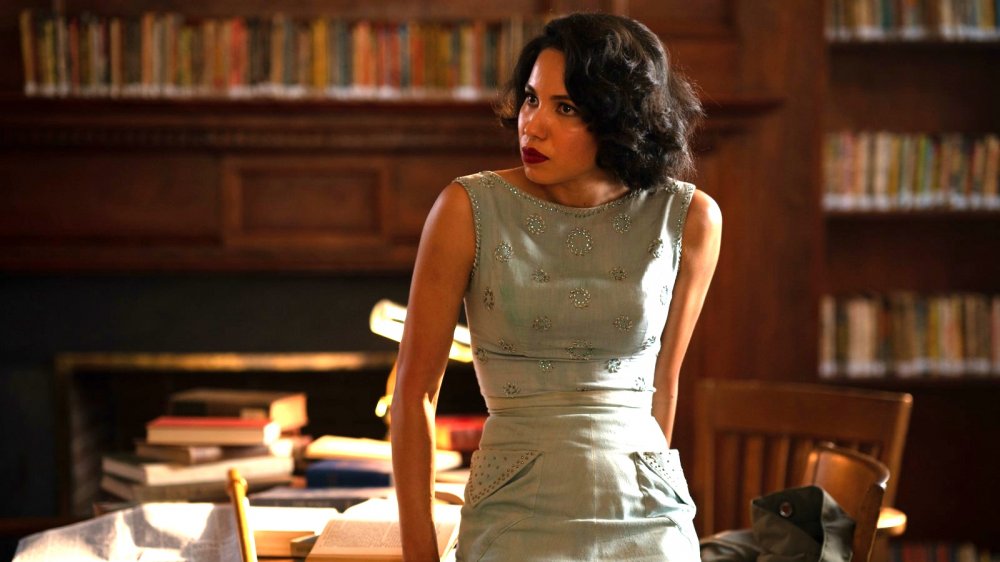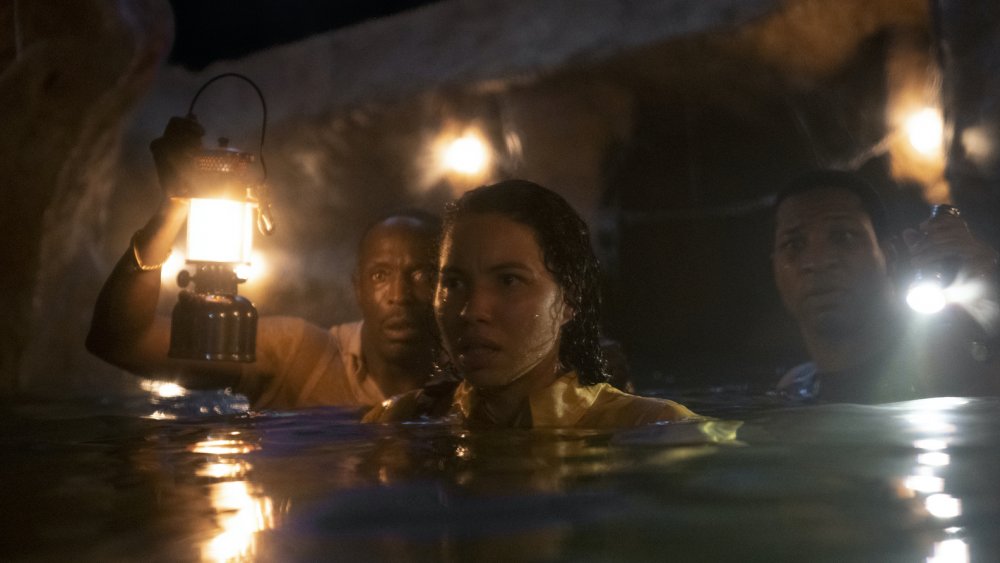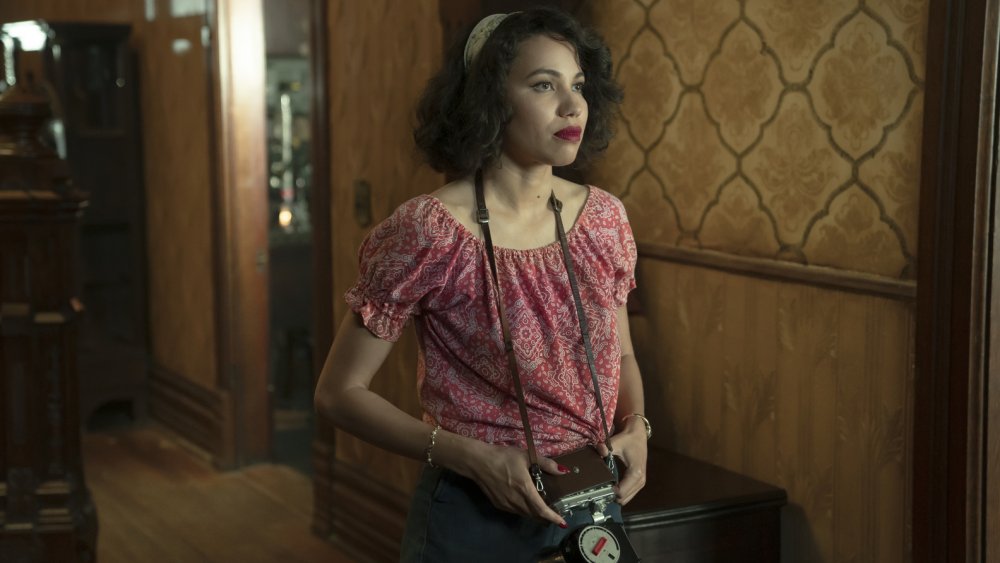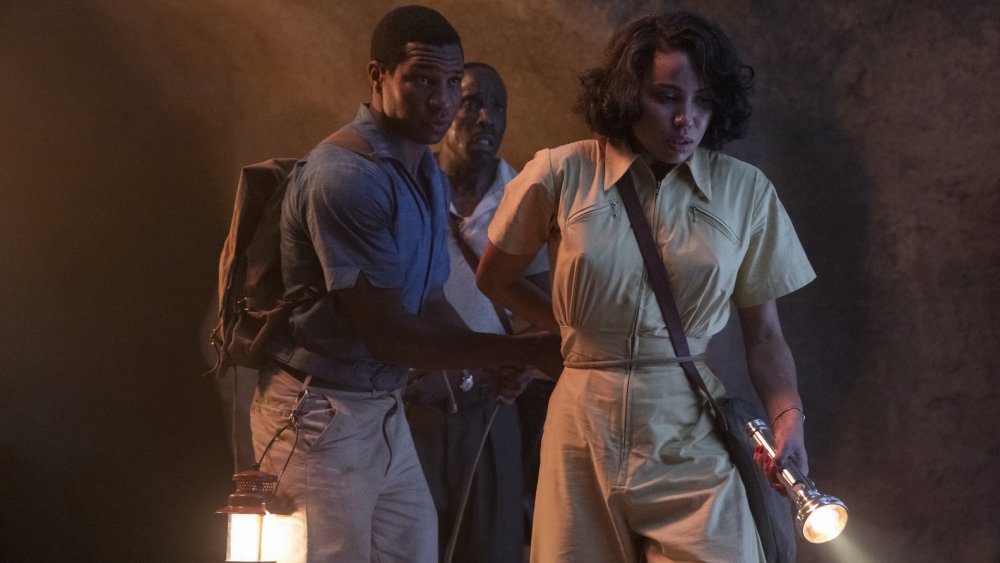Jurnee Smollett Talks Season 1 Of Lovecraft Country And More - Interview
If you're not watching HBO's Lovecraft Country, you're missing out on something truly unique. Based on the novel of the same name by author Matt Ruff, the plot centers around bibliophilic war veteran Atticus Freeman (Jonathan Majors) as he tries to piece together his family's mysterious past. His road leads him to Ardham, Massachusetts, where he discovers a startling truth about his lineage and learns that he has blood ties to a mystical cult known as the Order of the Ancient Dawn. He's soon swept into a world of magic, monsters, and supernatural mayhem.
Along for the ride is his childhood friend Leticia "Leti" Lewis, a buoyant and headstrong photographer who also has a mutual passion for science fiction literature — and she too is making life-changing discoveries about herself and her own metaphysical beliefs as she maneuvers through this strange new magical world that defies comprehension. Leti is played by Jurnee Smollett, who you might recognize as Black Canary from Birds of Prey. She also starred in WGN's Underground, another series taht explores themes such as racism and white supremacy — two topics that are not only bubbling at the surface of Lovecraft Country's 1950s Jim Crow-era setting, but are also incredibly relevant in today's world.
During a recent roundtable interview attended by Looper, Smollett didn't hesitate to share her thought-provoking views when asked to elaborate on the many pertinent social issues that Lovecraft Country boldly tackles. She also took some time to dissect her character and thoroughly explain what makes her tick. We also learned some surprising details about her professional relationship with showrunner Misha Green, the real-life influences that helped shape the role of Leti Lewis, and why Smollett has a strong passion for creating protest art.
Jurnee Smollett's grandmother was a major influence
How beneficial was it to have an existing professional relationship with Misha Green from your time working together on Underground, and how did that help you in shaping the character of Leti Lewis and feeling confident on the show?
It was pretty valuable in my process because when she and I first worked together on Underground, initially, we hated each other. I mean, it became a joke on set that anytime I was in a scene, we were going to be arguing for 20 minutes prior to shooting it. It's wild because when I think about that, we had such a bumpy start with each other, and it couldn't be more different now — it's the complete opposite, but I think we were both feeling the pressure. There were so many firsts. It was the first time Misha was a showrunner, it was the first time I was the lead of a show. We wanted to get it right, and through that pressure — you know, iron sharpens iron — that's kind of our relationship with each other. Our collaboration has grown into this beautiful relationship, but yeah, initially it was tough because we had to learn each other's love languages. And so, coming into Lovecraft Country, all that mess, we'd gotten through it, and now it's so fluid, I know her writing inside and out, she knows my process inside and out, and it's incredible to be able to work with someone who sees you, gets you, and vice versa. The collaborative spirit is quite rich with us.
What do you think fueled Leti to join the Freeman family on this journey? And what is something that she learns about herself that fundamentally changes her while on this journey of helping them take back what's theirs?
Leti is for sure this buoyant woman, and she's got this reputation for being a bit of a tornado when she comes to town, this disruptor, but really, she left home in search of her home. She's trying to find her tribe. She's trying to find her people. And she suffers from this feeling of displacement. She just desperately wants to find her space in the world. There was a quote that I kept going back to by James Baldwin, when he talks about the great shock that happens to Black Americans when you discover that this country, which is your birthright, which you owe your identity to, has not evolved a place for you. And so she's in this pattern of sabotaging relationships in her life, and pushing people away, and then comes Atticus, and there's a trauma bond that they experience together. They become soul-tied, through a secret. Which is a theme often explored in H.P. Lovecraft's work — family secrets.
One of the things I loved about playing Leti was this idea that we had to really lean in and inspect her contradictions, and really explore that. My grandmother was a big influence for me in approaching the foundation of Leti. She was a beauty queen — the first black Miss Galveston of Galveston, Texas — raised four children, single mom. And she maintained dignity throughout her life. I never met my grandmother, but I grew up hearing stories about this woman who would go to work every single day, cleaning white folks' homes, and she looked damn good doing it. She would press out her dress and do her hair and makeup every single morning. And her rebellion was that despite society trying to erase her, she was going to walk around with dignity and pride and not allow the erasure of her to exist. So those were some of the themes that we wanted to explore with Leti. And this idea of displacement, this idea of rebirth, is something that will come back towards the end, and it's a theme that will reoccur with her.
Leti Lewis is a dreamer
I really love what you said about the contradictions of this character. What really stuck out to me in watching these first episodes is how she's so strong and so vibrant, but she also has a softness to her. We've seen you play Black Canary, we've seen you on Underground, but you very rarely get to see these contradictions play out in such an interesting way on a fantasy or horror show. What was it like playing out these themes in a genre that usually hasn't made room for them to be explored?
I think one thing that was important to Misha and I in the portrayal of Leti is that no one is strong all the time. And as Black women, sometimes that in the narrative can be a trap. It doesn't benefit us, it doesn't serve us. Because then it doesn't leave room for us to, in real life, be vulnerable. Everyone always expects us to be strong and that's not true. That's false. And with Leti, yeah, it was very important to explore her vulnerability, to explore her fears, to explore this lineage of trauma she's inherited, to explore what it's like when someone is habitually abandoned by their mother, another Black woman. When someone wants to deny and rebel against everything the most important Black woman in her life stands for. When she rejects that Black woman, and yet she's so much like her. These stories that we're telling, they're very personal, and there's dangers when the truth is distorted.
There's dangers when we only tell one side of someone and I think with Leti, yeah, we just wanted to show her flaws, we wanted to show that we, as women, are living, breathing, flesh-and-blood beings, who sometimes do very crushable things for reasons we justify in our mind to be good. We can disrupt s***. We seek joy, and that's in itself a very radical act, right? She's really seeking to be liberated, to reject the feminine as it was defined in 1955. You've got to understand, she's fighting the patriarchy and white supremacy. And the patriarchy benefits from white supremacy and white supremacy benefits from the patriarchy. I think it just wouldn't have served us if we only played one side of the coin.
There are these moments in both the book and the show that really sort of remind you that Leti is what we would consider a nerd. She was invited into the boys' club and she was sort of bucking these assumptions about what it is that women can be in this time and space. I'm curious to hear, from your perspective, how does Leti's love of sci-fi within this universe really inform the way that she comes to just take everything that's happening to her and Atticus in stride? There's never really a moment where she's like, "Oh no." It's very much like, "Oh, here we go."
That's a great question. What happens with education or when you explore other worlds, like sci-fi, one of the many things it does is it opens your imagination. And I think that at the foundation of Leti is what drives her rebellion. And she is a dreamer. She's able to see things outside of what they currently are. And I would argue that being a part of the South Side Science Fiction Club as a kid helped her dream and to see the world in a bigger way. She's also traveled outside of Chicago, outside of the South side. She's traveled all over America and she's a bit of a wanderer. So that also opens her mind, being this drifter. She's seen other parts of the country that are ugly, but also beautiful and very much so in an era when the erasure of Black folks was so prevalent, she picks up a camera, like Gordon Parks, right?
And she just wants to document because she just wants to see. She's curious. She just wants to see our everyday life, and says, "We shall not be erased." So, I think those aspects of her life inform certain decisions, it informs her rebellion, it informs her disruption, it informs her radical approach to things. Instead of leaning away from her shadow, she leans into it, in a very bold and audacious way that arguably she could only have done because she is a dreamer.
Lovecraft Country sets up a bold finale
Lovecraft Country digs deep into a lot of social issues that are very relevant and still resonate today. I'm just wondering, out of all 10 episodes, do you have a favorite scene that you feel stands out and hits the nail on the head in addressing those issues?
Oh, that's very hard. Without giving too much away, I think by the end of the season, Lovecraft Country will have successfully deconstructed this classic genre, and just flipped it on its head by re-imagining it in such a bold and radical way. So it's hard for me to pick one scene because it's a collection of scenes and the way Misha has planned out the season, it builds into something, I don't want to give it away, but it's pretty bold. I think in general, the show is a story that's very ancestral, and it's a story in which our heroes go on a quest to bring down white supremacy. And the thing about the systemic racism that this nation has been built upon, is that it's not one target.
So I can't really pick one scene. It's not just the racist cop that pulls you over, and it's a danger to drive while Black. It's not just going to the department store and trying to apply for a job as a Black woman. It's not just trying to pioneer into an all-white neighborhood and dealing with the harassment, the oppression, that comes along in pursuing your place in the world.
I think what Lovecraft Country brilliantly explores is how complex racism is as a system. How the systemic racism that's built into the fabric of our nation attacks you from all fronts. You never really know where it's coming from and that's the terror of it. That's why racism is such a demonic spirit because when you're engaged in the spiritual warfare, you don't really know where it's coming from. You don't know the source. It could be you're walking down the street, just minding your business, and it comes at you. It's hard for me to pick one scene that depicts what we as a nation are experiencing now. It's very timely. Yeah, it is. Unfortunately, the themes explored in Lovecraft Country are things we're still reckoning with now. As we say, Emmett Till is Trayvon Martin, okay. We're walking in a circle as a nation. But I'm very encouraged because I love creating protest art, I just do. But also, it's just good entertainment. It's about some regular folks, it's a family drama in which the families are in pursuit of protecting their family, and the secrets hidden from their family. We're pursuing our joy. So, that's a long ass answer to your very simple question [Laughs], but I can't pick just one scene, I'm sorry. I can't.
New episodes of Lovecraft Country air on Sundays on HBO.



